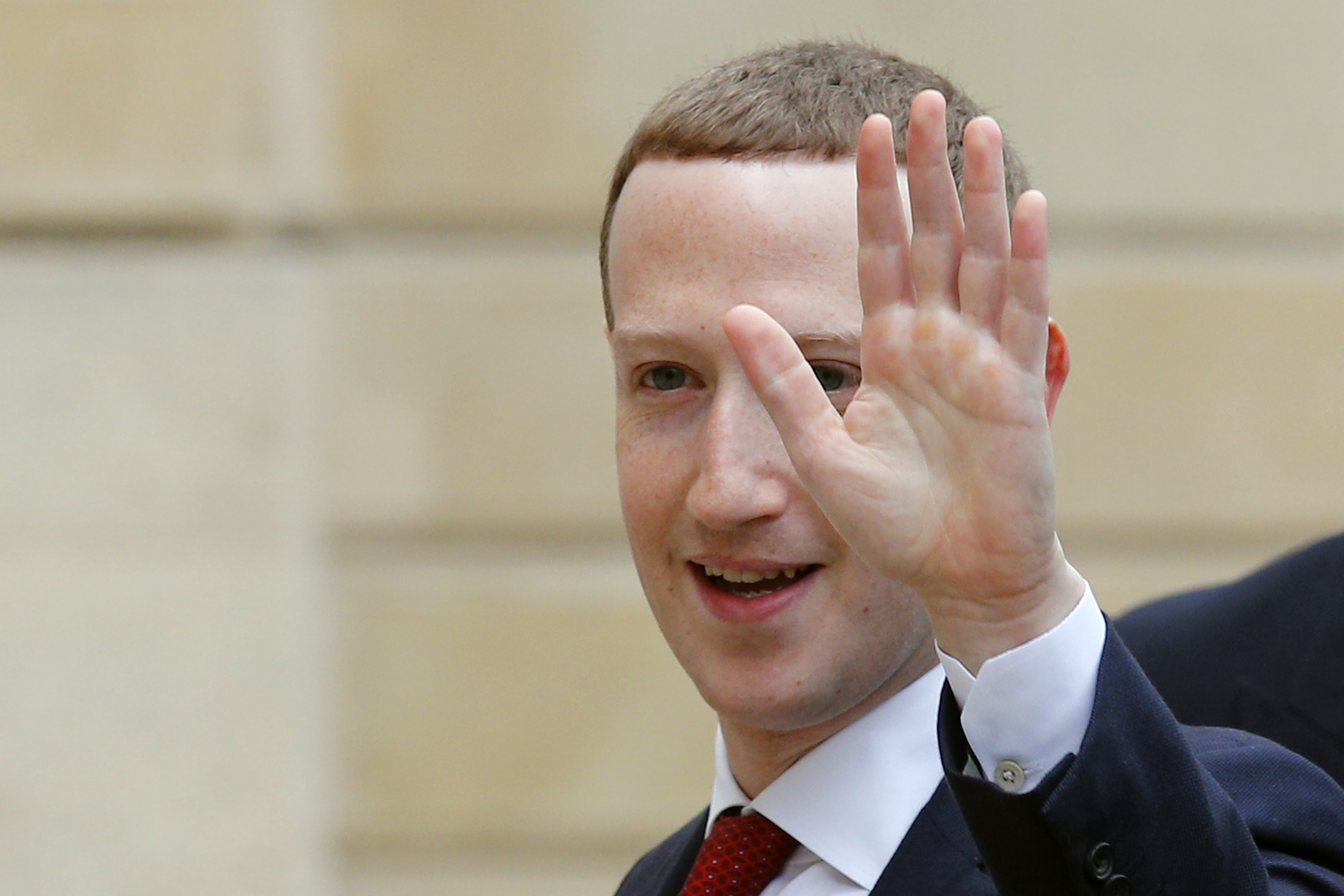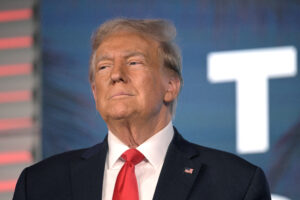Facebook’s Authoritarian Money Grab
The tech behemoth’s bid to create its own pseudocurrency à la China’s WeChat is likely to flop, but we can't afford to write it off. Facebook CEO Mark Zuckerberg. (Francois Mori / AP)
Facebook CEO Mark Zuckerberg. (Francois Mori / AP)
“Don’t be surprised,” said Terence Ray, one of the hosts of the Whitesburg, Ky.-based podcast “The Trillbillies,” “if Mark Zuckerberg starts trying to pay his employees in ‘Facebook Bucks.’ ” Ray made that comment in late May during a Means TV segment on the history of company money, or scrip, which was used throughout the 19th and 20th centuries by mining and logging companies in the United States. In some cases, scrip was still changing hands decades after it was made officially illegal by the Fair Labor Standards Act of 1938.
Lo and behold, not one week later, the business press began reporting that Facebook would, within the month, announce its own new proprietary cryptocurrency. What’s more, the tech giant would perhaps even “allow employees working on the project to take their salary in the form of the new currency,” a proposal of, at very least, dubious legality in the United States.
The actual announcement came this week—and it was more banal, stupid and terrifying than I had imagined.
This new currency, dubbed “Libra,” is, in the first place, not a currency. A consortium of investors—banks, credit card companies, venture capitalists, etc.—will pool millions or billions of dollars in order to purchase a “reserve” composed of “low-volatility assets, such as bank deposits and short-term government securities in currencies from stable and reputable central banks.” While the Libra will not be “pegged” to any particular currency—set, for example, to a fixed rate against the dollar—this reserve will be structured to “minimize volatility, so holders of Libra can trust the currency’s ability to preserve value over time.” This scheme stands in sharp contrast to something like bitcoin, whose wildly fluctuating values are purely speculative and whose only supposedly intrinsic value is an enforced scarcity: There can never be more than 21 million of its units.
The Libra is therefore not really a currency, but something occupying the interstitial space between a gift card, a share in a mutual fund, a negotiable instrument and an IOU.
And here we enter the territory laid out by the writer Max Read in a smartly speculative article for New York Magazine’s Intelligencer: Facebook is less interested in either the crypto or the currency, per se, than it is in becoming the dominant platform for payment, emulating the already existing and ubiquitous Chinese social-cum-payment network WeChat. “If you think Facebook is powerful now, just wait until it’s, essentially, the global federal reserve, overseeing a global currency over which it has not just monetary control but a visible, minable record of every transaction made,” he writes.
I think the likelihood of Facebook becoming such a “global federal reserve” is quite small. The Libra white paper put out by the Libra Association, a “not-for-profit membership organization, headquartered in Geneva, Switzerland,” evinces giddy optimism and the giddier absence of details of any pitch-meeting slide deck. There are no particular mechanisms for how individual units will be valued against either the so-called reserve or against any particular national currency. They’re not pegged to the dollar or euro, but they also can’t be treated as some kind of common share of overall value of the reserve, which would subject the Libra to weird fluctuations each time there was a new influx of capital into the reserve from some new institutional partner. (In a telling line, the white paper compares the reserve to the gold standard, a notorious bugbear of libertarian cranks.)
On the other hand, Read’s warning about “a visible, minable record of every transaction made” is precisely the sort of panoptical scheme that Zuckerberg’s Facebook is infamous for. As the CEO notoriously IM’d a friend in the early days of his company, “they ‘trust me,’ dumb fucks.” Facebook’s value proposition as a publicly traded corporation is precisely that it knows what its users do and like; therefore it’s the world’s most valuable space for targeted advertisement. To know about individuals’ actual finances—what they purchase; how much they send home to mom; what they withdraw from the ATM—is a step beyond, into a realm of omnipresent surveillance that no authoritarian regime dared dream of. That is, at least not before the modern People’s Republic of China, which, notably, Facebook is here self-consciously emulating.
Facebook is also not known for its diligence regarding user data privacy.
On a purely operational level, I am cautiously unconcerned about this latest move. Despite its seemingly indelible presence in public life, it increasingly feels as if Facebook is on the wane, buffeted by European investigators and increasingly bipartisan anger in the United States. Its legacy website and app are a disaster: terribly designed, cluttered and unbearably old, although it has retained its hold on younger consumers through its strategic acquisitions of messaging apps and Instagram. Nevertheless, if quitting Facebook is not yet a mass movement, then it has a social and cultural ease that it didn’t even a few years ago. If you gave a person today a binary choice between Facebook and, say, Amazon, I feel certain a vast majority would choose the latter, which may be no less evil, pernicious or ubiquitous, but which is at very least a practical necessity.
But this is a moment for caution, because if we interpret Facebook’s latest move as a hedge against the irrelevance and abandonment that ultimately plagued predecessor social networks (and contemporaneous competitors—I’m lookin’ at you, Ello and Google+), then we should be deeply concerned about its potential for flailing, destructive hostility. Zuckerberg and Sheryl Sandberg are confirmed bad actors, and while all corporations are by their nature amoral, Facebook has historically demonstrated a deliberate and almost personal immorality, a callous disregard for its users and partners that seems baked right into its corporate culture. I fully expect it will engage in every possible scheme—legal and otherwise—to convince and outright trick its user base, especially the aging, more affluent users of Facebook’s home app and website, into buying its pseudocurrency and using its payment apps.
At least until we have Fully Automated Gay Luxury Space Communism, money itself is, in a sense, a public good. Though it has been hoarded and corrupted by financial institutions and the billionaire class, misappropriated for wars and stolen from pensions, and though the Federal Reserve or the European Central Bank exist at a distance from direct electoral control, national currencies are still subjects of and subordinate to politics; they are at least theoretically susceptible to popular control.
Well, we have already let public forums be privatized by the Facebooks of the world, town squares turned into walled gardens. We might try to keep at least a few of our dollars out of the hands of a handful of weirdos with websites.
Your support matters…Independent journalism is under threat and overshadowed by heavily funded mainstream media.
You can help level the playing field. Become a member.
Your tax-deductible contribution keeps us digging beneath the headlines to give you thought-provoking, investigative reporting and analysis that unearths what's really happening- without compromise.
Give today to support our courageous, independent journalists.






You need to be a supporter to comment.
There are currently no responses to this article.
Be the first to respond.